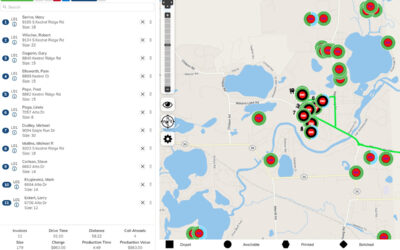Starting a lawn care business can be a great way to make some extra money, and it’s a business that you can start with relatively little up-front investment. In this article, we’ll give you a basic overview of how to start a lawn care business legally. We’ll also discuss some of the things you need to do to make it successful and help answer questions like, “Do I need a business license for lawn care?” So, if you’re looking for an exciting and profitable new venture, read on!

Deciding if a Lawn Care Business is Right For You
Starting a lawn care business can be a rewarding venture for individuals who enjoy working outdoors and have a passion for maintaining green spaces. However, before embracing this entrepreneurial journey, it is crucial to consider several essential factors that will determine if the lawn care industry is the right fit for you.
Assessing Your Skills and Passion
One of the first questions to ask yourself is whether you have the necessary skills and passion for the lawn care industry. While having prior experience in landscaping or gardening can be beneficial, it is not always mandatory. However, possessing a genuine interest and enthusiasm for working with plants, lawns, and outdoor environments is crucial. This industry requires attention to detail, physical stamina, and the ability to handle a variety of tools and equipment.
To assess your skills and passion, consider the following:
1. Gardening and Landscaping Experience:
Evaluate your prior experiences in gardening, landscaping, or lawn maintenance. If you have enjoyed these activities in the past and have the drive to learn and improve, it can be a positive sign.
2. Physical Fitness:
Lawn care work can be physically demanding. Consider your physical health and stamina to ensure you can handle the physical aspects, such as mowing, lifting heavy objects, and working in various weather conditions.
3. Patience and Attention to Detail:
Maintaining lawns requires patience and attention to detail. Assess your ability to concentrate on tasks for extended periods and handle repetitive work with precision.
4. Research and Education
Familiarize yourself with the lawn care industry by conducting thorough research. Learn about industry trends, best practices, equipment, and the various services offered. Obtain certifications or take courses to enhance your knowledge and credibility.
5. Financial Considerations:
Determine the financial implications of starting a lawn care business. Evaluate your budget for purchasing equipment, marketing, and covering initial operating expenses. Additionally, consider the potential for income fluctuation during the off-season.
6. Time and Commitment:
Running a successful lawn care business requires a significant time commitment. Assess your availability and willingness to dedicate yourself to building and growing the business. Consider the hours of operation, potential seasonal fluctuations in work volume, and the flexibility of your schedule.
Insights into the Pros and Cons of the Lawn Care Industry
Like any business venture, the lawn care industry has its share of pros and cons. It is crucial to have a clear understanding of these aspects to make an informed decision. Let’s explore each of them in detail:
Pros of the Lawn Care Industry:
1. Flexibility:
Running a lawn care business allows for flexibility in setting your own schedule and working within your preferred hours.
2. Outdoor Work:
If you enjoy spending time outdoors, this industry provides an opportunity to work in fresh air and natural environments.
3. High Demand:
Lawn care services are in high demand, especially in residential areas. This demand ensures ongoing business opportunities and potential for growth.
Cons of the Lawn Care Industry:
1. Physical Demands:
The physical demands of the lawn care industry can be taxing, especially during hot summer months or when managing larger properties.
2. Seasonal Variability:
Depending on your location, the lawn care industry may experience seasonal fluctuations, which can impact the consistency of work and income.
3. Competitive Market:
The lawn care industry is highly competitive, with numerous established businesses already operating. Differentiating yourself and attracting customers can require significant effort and effective marketing strategies.
Step 1: Gain Practical Lawn Care Experience
Before diving into the world of lawn care business ownership, it’s crucial to gain practical experience in the field. This experience not only helps you understand the nuances of lawn care but also equips you with the skills necessary to provide top-notch service to your future customers. Start by working for an established lawn care company or landscaping business. This hands-on experience allows you to learn the ins and outs of lawn maintenance, from mowing and edging to fertilizing and weed control. Pay attention to different techniques and best practices employed by seasoned professionals.
Additionally, consider volunteering your time to help friends or family members with their lawn care needs. This gives you an opportunity to practice your skills in a real-world setting and receive feedback on your work.
By gaining practical experience upfront, you’ll not only build your confidence but also develop a solid foundation of knowledge that will serve you well as you embark on your journey to start your own lawn care business.
Step 2: Get Started with a Business Plan
Starting and running a successful venture requires careful planning and strategic decision-making. One of the most crucial steps in launching your lawn care business is creating a comprehensive business plan. A well-crafted business plan not only serves as a roadmap for your company’s success but also demonstrates your professionalism to potential investors and lenders.
Setting Goals: A Clear Direction for Your Lawn Care Business
Setting goals is the first step towards achieving success in any venture. When creating your lawn care business plan, it’s essential to establish clear and attainable goals. Start by identifying both short-term and long-term objectives for your business.
Short-term goals may include acquiring a specific number of clients within the first six months, achieving a specific revenue target, or expanding your service area. Long-term goals could focus on building a reputation as the go-to lawn care service provider in your community or introducing specialized services like landscaping design.
Budgeting: Managing Your Finances Effectively
A well-defined budget is crucial to the financial success of your lawn care business. Your business plan should include an in-depth analysis of your expected expenses and anticipated revenue. Consider all costs, such as equipment purchases, fuel, maintenance, insurance, marketing, and employee wages.
Additionally, outline your pricing structure and how you plan to determine your prices. Research the market to evaluate the average rates charged by your competitors. Investigate what factors influence pricing in your area, such as yard size or additional services like pest control. Your pricing strategy should strike a balance between profitability and attracting customers in a competitive market.
Thinking of starting your lawn care business? Read our blog to find out how RealGreen can help make running and growing your business simpler through automation: Learn How RealGreen Makes Business, and Life, Easier
Step 3: Legal Considerations and Business Licenses
As you research the licenses you need to start a lawn care business legally, you’ll find that the requirements vary depending on your location and type of lawn care. However, there are some general things that you’ll need to do to get your business up and running.
- The first step is to choose a business structure. This will determine what lawn care business licenses and permits you’ll need to obtain. Lawn care businesses’ most common business structures are sole proprietorships, partnerships, limited liability companies (LLCs), and corporations.
- Once you’ve chosen a business structure, you’ll need to register your business with the state in which you plan to operate. You’ll also need to obtain a federal tax identification number (EIN).
- Once your business is registered, you must obtain the proper licenses and permits. How much does a lawn care business license cost? The type of license you need and its cost will depend on the kind of work you’ll be doing and your location. For example, if you plan to provide lawn care services, you must obtain a business license. If you plan to use pesticides or herbicides, you must obtain a pesticide applicator’s license.
- After you’ve obtained the necessary licenses and permits, you’ll need to purchase lawn care business insurance. This will protect you if something goes wrong while you’re working.
Step 4: Decide Which Lawn Care Services to Offer
When starting a lawn care business, it’s essential to carefully consider which services you’ll offer to your customers. While some businesses may focus solely on basic services like mowing and edging, others may choose to provide a wider range of offerings to meet the diverse needs of their clientele.
Begin by assessing your skills, equipment, and resources to determine which services you’re equipped to provide effectively. Common lawn care services include:
-
Mowing:
Regularly cutting grass to maintain a neat and tidy appearance.
-
Edging:
Creating clean lines along sidewalks, driveways, and garden beds.
-
Trimming:
Pruning shrubs, bushes, and trees to promote healthy growth and enhance aesthetics.
-
Fertilizing:
Applying nutrients to the soil to promote lush, green grass and strong root development.
-
Weed Control:
Removing or treating weeds to prevent them from overtaking the lawn.
-
Aeration:
Loosening compacted soil to improve water and nutrient absorption.
-
Seeding:
Planting new grass seed to fill in bare patches and promote a thicker lawn.
-
Pest Control:
Identifying and treating pests such as insects or rodents that may damage the lawn or landscaping.
Consider the demand for each service in your target market and the level of competition from other lawn care businesses. You may also want to specialize in certain services that are in high demand or underserved in your area.
Step 5 : Purchase the Right Lawn Care Equipment and Tools
Before you can start mowing and trimming, you need to make sure you have everything you need. Here’s a detailed list of essential lawn care equipment:
1. Lawn Mower:
A reliable lawn mower is a must-have for any lawn care business. Consider whether you need a push mower for small yards or a ride-on mower for larger properties. Ensure that the mower’s cutting width suits your business’s needs.
2. Trimmer or Edger:
Trimmers help you maintain a neat and tidy lawn by trimming around fences, flower beds, and other obstacles. Edgers, on the other hand, are used to create clean and distinct boundaries along driveways and sidewalks.
3. Blower:
A leaf blower is essential for clearing grass clippings, leaves, and debris from walkways, patios, and lawns.
4. Hedge Trimmer:
If you plan on offering hedge trimming services, invest in a high-quality hedge trimmer for precise and efficient cutting.
5. Hand Tools:
Don’t forget to include basic hand tools such as rakes, shovels, and pruners. These tools will help you tackle various tasks like spreading mulch, planting flowers, and pruning small branches.
6. Sprayer:
To provide weed control or fertilization services, a sprayer is essential. There are various types of sprayers available, including handheld, backpack, and tow-behind options.
7. Safety Gear:
Always prioritize safety and invest in protective gear for yourself and your employees. Safety glasses, gloves, hearing protection, and steel-toe boots are a few essentials to consider.
Should I Purchase or Lease Lawn Care Equipment?
When it comes to acquiring lawn care equipment, you have two main options: purchasing or leasing. Purchasing equipment provides the advantage of full ownership, allowing you to make any modifications or repairs as needed and potentially save money in the long run. On the other hand, leasing equipment offers flexibility, especially for businesses starting out or looking to diversify their services. Leasing can provide access to high-quality equipment without upfront costs, making it easier to manage cash flow.
Step 6: Hire the Best Lawn Care Employees
In any business, one of the key ways to achieve success is by having a dependable workforce. This is particularly true for the lawn care business. Many companies in this industry find their biggest cost isn’t equipment or advertising, but hiring employees. To create an lawn care employee base you can trust, there are certain things that you, as a business owner, need to do to build a culture of success.
One way to ensure your lawn care employees are reliable is by setting clear expectations from the start. When hiring someone, take time to explain exactly what is expected of them in their role. You might include specific tasks they’ll be responsible for, daily or weekly quotas they must meet, and other factors. The more specific you can be, the better. Not only will this help the employee understand what is expected of them, but it will also make it easier to hold them accountable if they’re not meeting your expectations.
Another way to keep your employees reliable is by maintaining open communication with them. Let them know if they are doing a good job or if there are areas where they need to improve. Likewise, give them the opportunity to provide feedback about their job or suggest ways that the business could run more smoothly. Open communication can help create mutual respect between you and your employees, making them feel like part of a team rather than just another cog in the machine.
Learn More: Discover the Top 5 Ways to Hire and Keep the Best Employees
Step 7: Promote Your Lawn Care Business with Marketing and Branding
Marketing is essential to getting new clients as a company. There are many ways to market your business, and it’s vital to find the right mix of methods that work for you.
Word-Of-Mouth
One way to market your lawn care business is through word-of-mouth. This can be done by providing excellent lawn care services to your current clients and asking them to spread the word to their friends and family. You can also offer discounts or coupons to new lawn care clients whom current clients refer to.
Online Directories and Websites
Another way to market your lawn care business is with a lawn care business website and through online directories. These directories list businesses in specific categories, making it easy for potential customers to find you. Make sure you create a complete and accurate listing, including your company’s name, contact information, and services offered.
You can also market your lawn care business through social media. This is a great way to connect with potential customers and build relationships. Be sure to post interesting and informative content that will help promote your business. You can also use social media to offer discounts or coupons to encourage people to try your services.
Traditional Advertising
Finally, you can market your lawn care business through traditional advertising methods such as print ads, television commercials, or radio ads. While these methods may cost more upfront, they can reach a wider audience and generate more leads than word-of-mouth or online directories.
Marketing your lawn care company is an essential task, but it’s also one that can take a lot of time and specific expertise. Partnering with marketing professionals and using software that helps you market your business with tools including automated marketing messages, customer notifications, and print marketing materials is a great way to help grow your business and free up more time to work on your day-to-day tasks.
RealGreen’s personalized marketing solutions can help kickstart your growth! RealGreen offers tools and solutions tailored to fit your lawn care company’s specific marketing needs—print, mail, and digital. Learn more here!
Step 8: Build Your Customer Base:
There are a few fundamental points to keep in mind when it comes to finding lawn care clients. First and foremost, you want to make sure that your ideal lawn care client is located in an area that is convenient for you to serve. This could be a specific town or city or even a particular neighborhood within a larger metropolitan area. After you have a general idea of where your ideal clients are located, you can narrow down your search by looking at specific characteristics that would make someone a good fit for your business.
Some of the most important considerations when trying to identify the ideal lawn care client include:
-
The size of their property:
do they have a large lot that will require significant time and effort to maintain or a smaller yard that will be relatively easy to care for?
-
The condition of their lawn:
is it in need of significant repairs and renovations, or is it already in good shape and needs regular upkeep?
-
Their budget:
Are they willing to invest the necessary money to keep their lawn looking its best, or are they looking for a more economical solution?
-
Their schedule:
Do they have the time to take on lawn care responsibilities themselves, or do they need someone who can handle everything every week?
Once you have a good idea of what your ideal lawn care client looks like, you can start to focus your marketing efforts and attract the right kinds of customers. Not every potential client will fit perfectly into your ideal lawn care client mold. However, you can maximize your chances of success by targeting those who come the closest.
Grow Your Lawn Care Business With RealGreen
Starting a lawn care business can be a great way to make money on the side or even as your main source of income. However, it’s not as easy as simply putting up a sign and mowing lawns. You’ll need a business license, business insurance, and methods to market yourself to find clients.
RealGreen’s Service Assistant® software is designed to simplify and automate the daily tasks and marketing activities of your lawn care business, enabling you to grow and scale your operations. Learn more about getting started with Service Assistant®!
FAQs
1. What equipment is essential for a lawn care startup?
Essential equipment for a lawn care startup includes lawnmowers, trimmers, edgers, leaf blowers, and a trailer or truck for transportation.
2. How can I create a solid business plan for my lawn care venture?
To create a solid business plan for your lawn care venture, outline your goals, target market, services offered, pricing, competition analysis, marketing strategies, and financial projections.
3. What permits and licenses are required to operate a lawn care business?
Permits and licenses required to operate a lawn care business vary by location but commonly include a business license, landscaping contractor license, and liability insurance.
4. How do I determine pricing for my lawn care services?
Determine pricing for your lawn care services by considering factors such as the size of the lawn, complexity of the job, frequency of service, market rates, and desired profit margin.
5. What marketing strategies work best for promoting a lawn care business?
Effective marketing strategies for promoting a lawn care business include creating a professional website, utilizing social media platforms, networking with local businesses, offering referral incentives, and distributing flyers in target neighborhoods.
6. How can I effectively manage my lawn care business’s daily operations?
To effectively manage your lawn care business’s daily operations, establish a schedule, organize equipment and supplies, communicate with clients, maintain proper records, track expenses, and consider using lawn care management software to streamline tasks.



